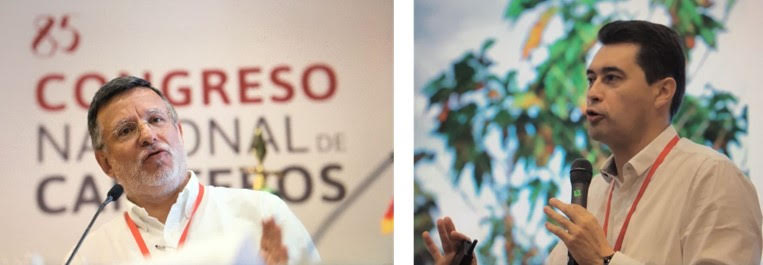- Institutional work led by the FNC Technical Division, including Cenicafé (the R&D arm), seeks to optimize harvesting, reduce labor costs, and continue protecting Colombian coffee crops from diseases.
Manizales, Caldas, December 6, 2017 (FNC Press Office) – Assisted coffee harvesting tests are promising and fight against rust shows important advances, Colombian coffee growers were shown today on second day of their 85th National Congress.
The Chief Technical Officer of the Colombian Coffee Growers Federation (FNC), Hernando Duque, showed Congress delegates the results of tests on assisted harvesting to reduce labor costs without sacrificing Colombian coffee high quality.
Field evaluations of meshes (on which handpicked fruits are dropped) yield substantial increases in volumes collected compared to the traditional container method. “Using meshes and machines that increase yields in coffee harvesting require a mind shift,” Duque said to the Coffee Congress attendees.
The Brudden shaker machine and the Alpha prototype (an electric machine that works with batteries that last more than one day) have also yielded major increases in volume of harvested beans.
Duque noted that assisted harvesting field days have been attended by coffee farmers, federated leaders, and representatives of coffee grower cooperatives from the Caldas, Huila, Antioquia and Santander departments.
In these field days, participants have experimented with the devices: either prototypes developed by Cenicafé or brought from countries such as Brazil and Italy and adapted to local conditions by researchers from Cenicafé’ Mechanical Engineering area.
The FNC has also explored alternative innovation mechanisms through a global call, in response to which 64 proposals were received from 15 countries, of which 59% are from researchers, 32% from entrepreneurs (startups) and 9% from established companies; 62% of submitted proposals are from Colombia.

In 2018, resistant-to-rust regional varieties will be delivered
Álvaro Gaitán, director of Cenicafé, presented rust forecasts for Colombia, highlighting the FNC’s work to continue protecting coffee crops from this disease, in constant mutation and thus able to break resistance of some varieties.
Gaitán said that chemical synthesis molecules and fungicides and biological products are being assessed to control rust, a disease that in susceptible varieties can reduce production by over 29%.
Gaitán informed the delegates about rust monitoring: strains that infect materials of different resistance degrees are still observed.
He also reported on development of a new strategy for re-composition of regional Castillo varieties with selection of 20 rust-resistant materials by keeping genetic diversity, which guarantees disease resistance in the long term.
By 2018 the Cenicafé 1 variety is expected to be delivered to coffee farmers, as well as zonal Castillo varieties adapted to specific coffee regions in the country.

